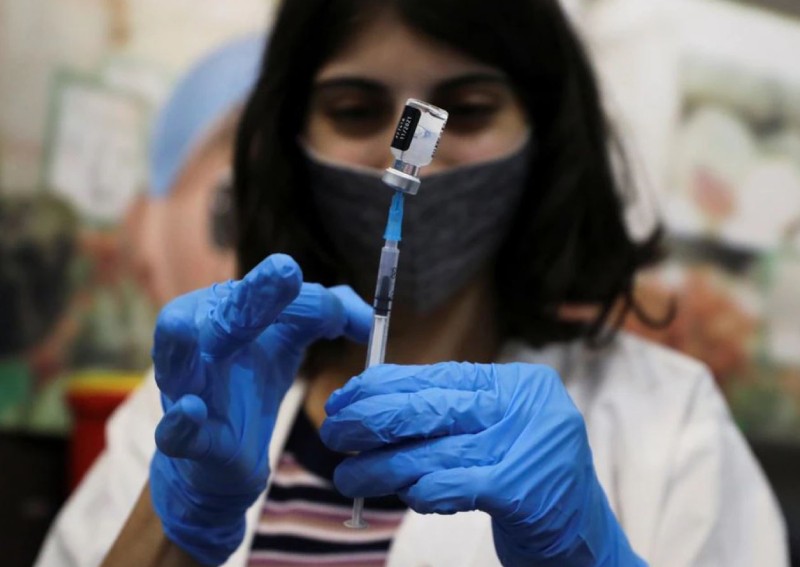Israel finds fourth vaccine boosts antibodies 5-fold; violence at pandemic protests in Germany

A fourth dose of Covid-19 vaccine boosts antibodies five-fold a week after the shot is administered, Israeli Prime Minister Naftali Bennett said on Tuesday (Jan 4), citing preliminary findings of an Israeli study.
“A week into the fourth dose we know to a higher degree of certainty that the fourth dose is safe,” Bennett said at Sheba Medical Centre, which is giving second booster shots in a trial among its staff amid a nationwide surge in Omicron variant infections.
“The second piece of news: We know that a week after administration of a fourth dose, we see a five-fold increase in the number of antibodies in the vaccinated person,” he told reporters.
“This most likely means a significant increase against infection and … hospitalisation and (severe) symptoms,” Bennett said in English.
Israel has played a leading role in studying the effects of Covid-19 vaccines , as the fastest country to roll out two-dose inoculations to a wide population a year ago and one of the first to give third shots as boosters. It is now administering fourth doses of the Pfizer/BioNTech vaccine to people over 60, health workers and immunocompromised patients.
Violence at pandemic protests in Germany
Police in Germany have reported sporadic violence at demonstrations against the country’s pandemic restrictions, with one protester in the eastern town of Lichtenstein biting an officer and another attempting to steal a service weapon.
Tens of thousands of people in total took to the streets in scores of German towns and cities for weekly marches that have organisers have labelled “strolls” in an attempt to bypass restrictions on public gatherings. Counter-protests were also held in towns such as Rostock and Trier, it was reported.
Most of the rallies passed peacefully, though many broke rules on social distancing, prompting officers to intervene. People detained dozens of people, some of whom face criminal charges or fines for breaching Covid-19 rules.
Police in the eastern state of Saxony said the incident late on Monday in Lichtenstein occurred when officers tried to pull about 60 rowdy people out of a march to check their identities. Several of the protesters attacked police and sprayed them with chemical irritants.
“One person attempted to seize an officer’s service weapon and another police officer suffered a bite wound from a participant of the gathering,” Saxony police said in a statement.
In Bautzen, further east, some participants of a 600-strong march attempted to break through a police cordon. While in Magdeburg, the capital of neighbouring Saxony-Anhalt state, protesters hurled bottles and fireworks at police.
The protests took place before a meeting on Tuesday of Germany’s pandemic expert panel, which is expected to submit new recommendations to the government for how to respond to the outbreak. A meeting of state and federal leaders is scheduled for Friday.
UK care home staff waiting a week or more for Covid test results
A British home care chief has called for care workers to be prioritised when coronavirus tests are processed, as it emerged some carers are waiting more than a week for results.
Dr Jane Townson, chief executive of the Homecare Association, said this will help maintain workforce capacity amid ongoing pressures that are being exacerbated by the spread of Omicron.
Examples provided by a national home care provider, which have been flagged to the government, illustrate some of the problems staff are experiencing in getting PCR test results.
Testing is “a big issue in the short term”, and is “really key” to keeping everything going safely. “I think it’s very, very patchy – it’s very regional,” Dr Townson said.
“And of course, all the time that the tests don’t come back, people can’t get back out to work … the difficulty obtaining lateral flow tests is problematic,’ she added.
“So I’ve made the point many times to the department – that they shouldn’t announce policies without it being possible to actually implement them in practice, because it creates another whole load of issues.”
French parliament halts debate on stiffening pandemic rules
The French government’s plans to stiffen contact rules for those not vaccinated against the coronavirus were jeopardised after parliament refused to prolong its session into the early hours of Tuesday.
The government would attempt to stick to its plan to introduce drastic new restrictions by January 15, Gabriel Attal told the France Inter broadcaster after the National Assembly rejected a government motion to prolong its session past midnight.
The government’s aim was to fast track the new legislation through parliament, with Health Minister Olivier Véran due to appear before the upper house, the Senate, on Tuesday afternoon.
The draft legislation provides for access to public places, such as restaurants, cafés and long-distance transport, to be restricted to those who have been vaccinated, with the new rules enforced for all over the age of 12.
Infection rates have risen sharply in France over recent weeks, with the national seven-day incidence currently at around 1,825 new cases per 100,000 people.
Swedish king and queen test positive for the coronavirus
Swedish King Carl XVI Gustaf and his wife, Queen Silvia, have both tested positive for the coronavirus, but only have mild symptoms, according to a statement issued by the royal family on Tuesday.
Both are doing well under the circumstances, the statement said. They have had three vaccinations against Covid-19, and are now isolating in line with the national regulations and are taking medical advice.
Carl Gustaf and Silvia are not the first members of the Swedish royal family to test positive for the virus. Their son, Prince Carl Philip, and his wife, Princess Sofia, tested positive in November 2020, while the heir to the throne, Victoria, and her husband, Prince Daniel, tested positive in March.












Leave a Reply